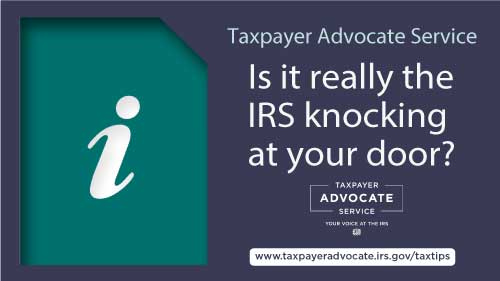
In certain situations, the IRS may send an employee out to your residence or place of business to collect past due taxes or conduct an audit of your return. With in-person scams continuing to take place across the country, the Taxpayer Advocate Service wants you to know how and when the IRS may contact you in person to help you protect yourself against possible in-person scams.
Eight things to know about in-person contacts from the IRS:
- The IRS initiates most contacts through regular mail delivered by the United States Postal Service.
- There are special circumstances when the IRS will come to your home or business.
- These include:
- When you have an overdue tax bill;
- When the IRS needs to secure a delinquent tax return or a delinquent employment tax payment;
- To tour a business as part of an audit; or As part of a criminal investigation.
- These include:
- Revenue Officers are IRS employees who work cases that involve an amount owed or a delinquent tax return. Generally, Revenue Officer home or business visits are unannounced.
- Revenue Officers carry two forms of official identification, a pocket commission and a HSPD-12 card. Both forms of ID have a photo of the employee and serial numbers. You can (and should) ask to see both IDs before discussing any sensitive or personal information. You may also call the IRS at a phone number provided by the Revenue Officer to confirm his or her identity.
- The IRS can assign certain cases to private collection agencies (PCAs) after notifying you in writing. These PCAs will never visit you at your home or business.
- The IRS will not ask you to make a payment to anyone other than to the U.S. Department of the Treasury.
- Revenue Agents are IRS employees conducting audits. They may call you to set up appointments, but not without having first notified you by mail. Therefore, by the time a Revenue Agent visits you at your home or business, you will be aware of the audit.
- An IRS Criminal Investigator may visit your home or business unannounced while conducting an investigation. However, these are federal law enforcement agents and they will not demand any sort of payment.
When interacting with you, Revenue Officers have the responsibility to educate you about the Taxpayer Bill of Rights (TBOR) and identify economic hardships if you have an outstanding federal tax debt and payment creates a hardship. They also have the responsibility to consider other means of resolving tax debts, including installment agreements and offers in compromise.
IRS employees do not:
- Call to demand immediate payment using a specific payment method such as a prepaid debit card, gift card or wire transfer.
- Demand that you pay taxes without the opportunity to question or appeal the amount they say you owe.
- Threaten to bring in local police, immigration officers, or other law-enforcement to have you arrested for not paying. The IRS cannot revoke your driver’s license, business licenses, or immigration status. Threats like these are common tactics scam artists use to trick victims into buying into their schemes.
If you believe you were visited by someone impersonating the IRS, you can find information on how to report scams here.
Need help with a specific tax problem?
The Taxpayer Advocate Service is an independent organization within the IRS that helps taxpayers and protects taxpayers’ rights. We can offer you help if your tax problem is causing a financial difficulty, you’ve tried and been unable to resolve your issue with the IRS, or you believe an IRS system, process, or procedure just isn’t working as it should. If you qualify for our assistance, which is always free, we will do everything possible to help you.
Visit www.taxpayeradvocate.irs.gov or call 877-777-4778.
Read more about the kinds of problems TAS handles and how we may be able to assist you with yours.
For current information about IRS operations during the COVID-19 pandemic, please visit irs.gov.
Taxpayer Rights:
- The Right to Be Informed
- The Right to Quality Service
- The Right to Privacy
- The Right to Retain Representation
For More Resources and Information:
IRS
- Is that the IRS contacting you – or is it a scam?
- How to Know if the Knock on Your Door is Actually Someone from the IRS
- IRS Provides Tips on Determining If It’s Really The IRS At Your Door
- How to know it’s really the IRS calling or knocking on your door
- How To Know it’s Really the IRS Calling or Knocking on Your Door: Collection
- How to know it’s really the IRS calling or knocking on your door: Audits
Taxpayer Advocate Service
- I need help resolving my balance due
- I can’t pay my taxes
- Payment Plans
- Offer in Compromise
- Currently Not Collectible
- Installment Agreements
- Audits by Mail
- Audits in Person
- Audit Reconsiderations
You can also visit the TAS Tax Tips page throughout the tax filing season to get helpful information.
Source: taxpayeradvocate.irs.gov

Leave a Reply